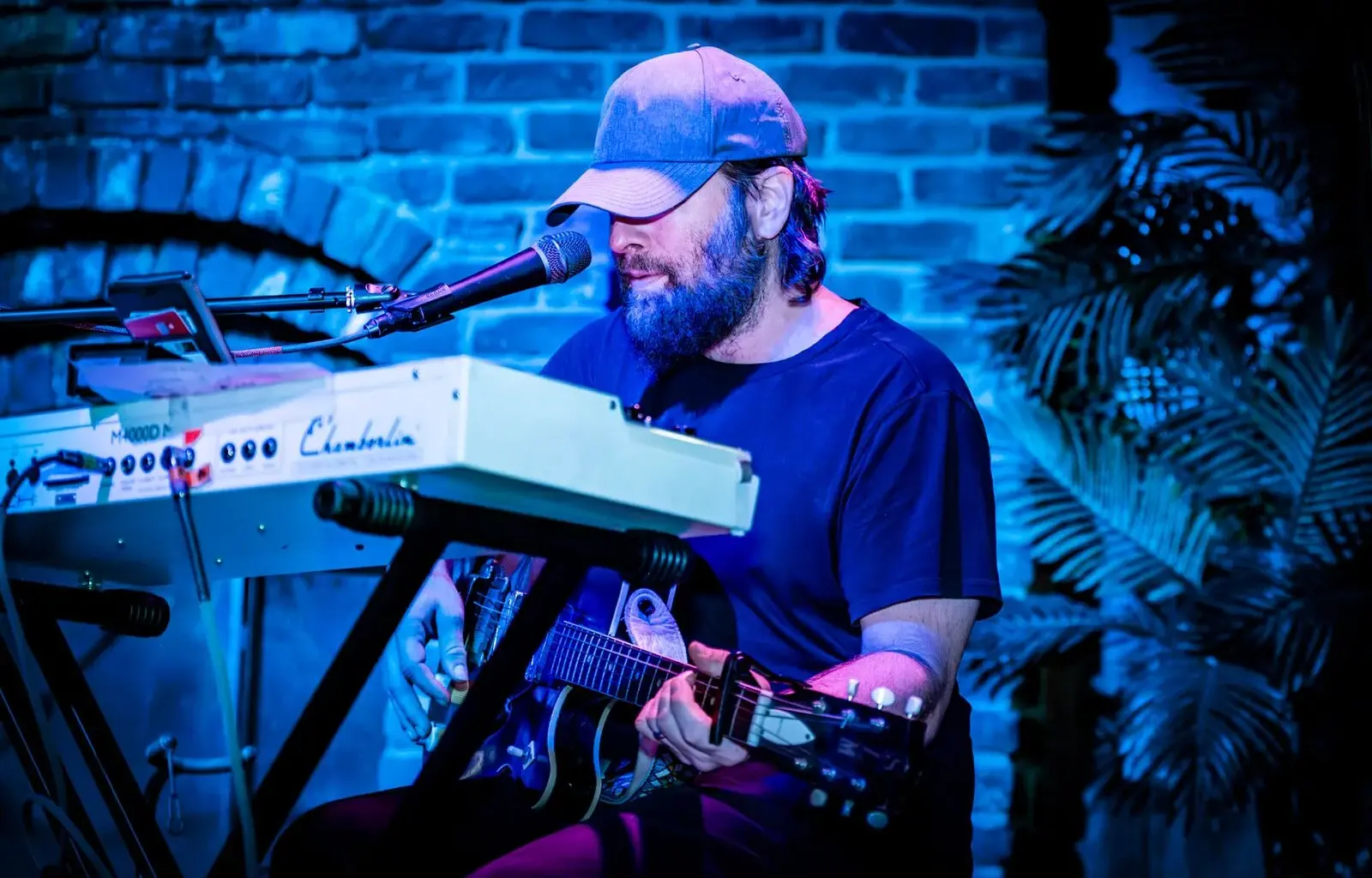Oakland bar owner and musician Scott Ayers knows what it is like to be an up-and-coming musician traveling constantly to play gigs, without the safety net of a steady paycheck and health insurance in case an emergency arises on the road.
Ayers, a musician from Burlington, Vermont, moved to Oakland in 1997 and, in the early 2000s, formed the band The Lovemakers under the stage name Scott Blonde alongside bandmate Lisa Light. In 2016, Ayers purchased the bar in Rockridge alongside record producer and music lawyer Jeff Saltzman, best known for representing bands such as Green Day, The Offspring, Primus, Testament, Papa Roach, Rancid, Mudhoney, and Filter. Saltzman is also the producer on The Killers’ debut album, “Hot Fuss.”
“Every year, we [traveling musicians] would converge at South by Southwest. And, every year, the thing that we would be scared of was seeing which band didn’t make it that year, either through some sort of sickness or some crazy car accident,” Ayers said. “There’s this constant fear deep down in every band, where we can’t believe we stayed healthy.”
Ayers met Kirk Crenshaw three years ago through a mutual friend when Crenshaw needed a venue for a show by Tommy Stinson, the former bass guitarist for The Replacements. The show was supposed to take place in Crenshaw’s backyard, but rainy weather and the need for a new venue for the show turned into an unexpected partnership.
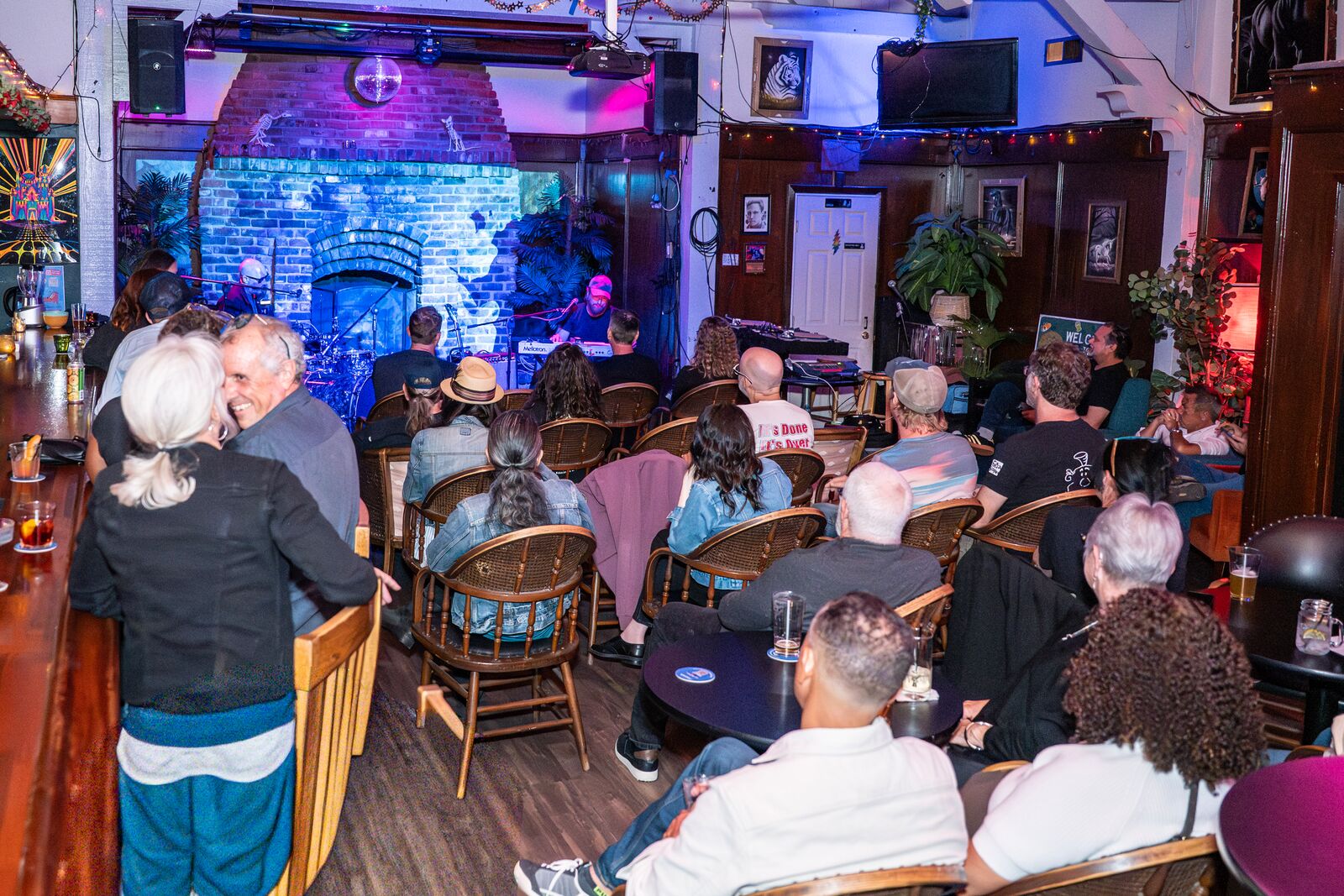 The intimate shows at RIC Bar that benefit Sofaburn, Inc. are not advertised; there are no flyers, and no ticket link is provided. Credit: Jerome Parmer for The Oaklandside
The intimate shows at RIC Bar that benefit Sofaburn, Inc. are not advertised; there are no flyers, and no ticket link is provided. Credit: Jerome Parmer for The Oaklandside
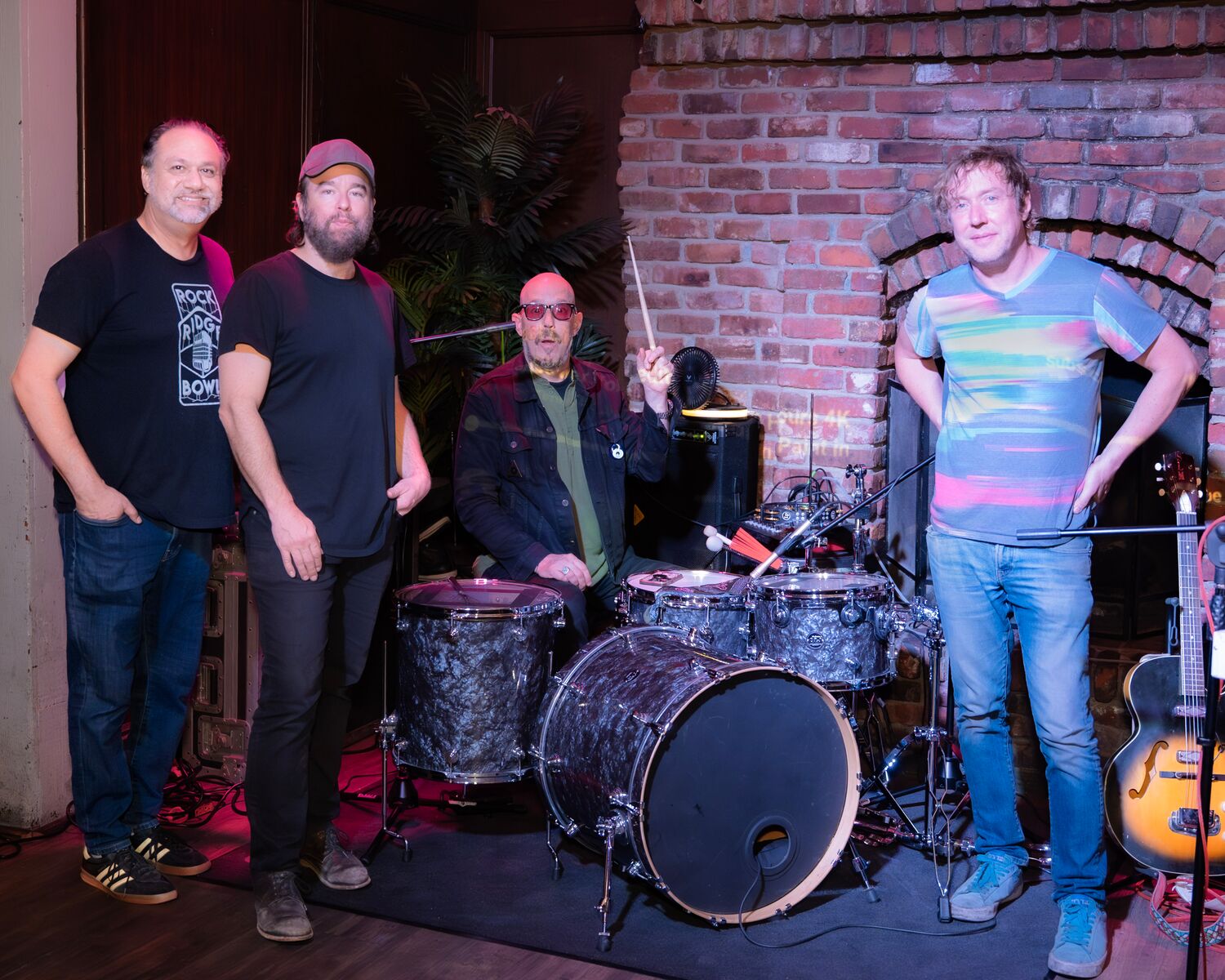 From left to right: Kirk Crenshaw, Alex Maas of The Black Angels, Rob Kidd, and Scott Ayers at RIC Bar in Rockridge. Credit: Jerome Parmer for The Oaklandside
From left to right: Kirk Crenshaw, Alex Maas of The Black Angels, Rob Kidd, and Scott Ayers at RIC Bar in Rockridge. Credit: Jerome Parmer for The Oaklandside
After that performance, Crenshaw pitched Ayers the idea of hosting private shows at the bar with the proceeds benefiting musicians in need of healthcare subsidies. Ayers was immediately on board.
Crenshaw is the founder of the Rockridge Bowl, a community group that supports art and live music, and also the co-founder of Sofaburn Inc., an organization providing health subsidies for musicians.
Sofaburn Inc. was born in 2020, when the pandemic lockdowns shuttered concert venues and musicians’ income cratered as a health crisis descended on the country.
Crenshaw linked up with Chris Mueller, founder of SofaBurn, a record label out of Kentucky, Lynn Baker, a health insurance specialist, and musician Adam Nurre, the lone survivor of a fatal crash while on tour who had his recovery paid for by organizations including Health Alliance for Austin Musicians, the SIMS foundation, and MusiCares. The quartet formed SofaBurn Inc. as a nonprofit to help musicians pay for health-related costs, bring down healthcare bills and help with enrollment.
SofaBurn Inc. is staffed entirely by volunteers, and 100% of the donations go towards supporting musicians, Crenshaw said. Since its launch, SofaBurn Inc. has helped over 100 artists. So far in 2025, the organization has raised over $30,000 to continue to support artists through next year.
“The most interesting thing that we encountered as an organization is that people didn’t believe we were real, because musicians get taken advantage of all the time,” Crenshaw said. “It was like, we will pay your healthcare, and they’ll ask, ‘What do you want from me?’”
Will Overman, a singer-songwriter from Virginia is one of the musicians Sofaburn, Inc. has helped. Overman said that he found navigating the healthcare marketplace unappealing and cost-prohibitive.
Overman met Chris Mueller, one of the co-founders of the organization through his manager. Even though Overman knew Mueller, he had doubts about the organization’s ability to help.
“I can be pretty suspicious in general, especially these days,” Overman said. “But when something sounds too good to be true, it most often is, and this wasn’t which was great.”
According to Overman, Sofaburn, Inc. has been paying for his monthly premium for the past two years. “There’s a high possibility I would not have insurance if Sofaburn wasn’t helping me,” Overman said.
SofaBurn Inc. follows a similar approach to other organizations, such as MusicCares, that provide short-term financial assistance for personal needs, addiction recovery, and funds for health services.
One battle that Crenshaw and the team at SofaBurn, Inc., are currently dealing with is the increase in premiums. Currently, one of the main budget issues at play involving the government shutdown is the pressure Republicans are facing from Democratic colleagues in congress to extend billions of dollars in federal tax credits for healthcare plans through the federal marketplace. A KFF analysis found health insurance premiums will increase an average of 75% if the subsidies aren’t extended. Additionally, the analysis also concluded that premiums could rise to compensate for higher tariffs on imported pharmaceuticals.
“We’re worried about it, we’re expecting a huge jump in the premiums,” Crenshaw said. “Out of every year, we’ve made one of the biggest pushes to raise more money this year, not only because we’re getting more visible. But also because we’re seeing higher medical expenses.”
The partnership between Ayers and Crenshaw has helped SofaBurn Inc. with its advocacy efforts, given their deep connections to the music industry. Crenshaw started Rockridge Bowl when he was planning his wife’s 40th birthday party, and they both wanted Fountains of Wayne to play at her birthday bash. From there, Crenshaw began hosting shows in his backyard, each benefiting a different nonprofit, such as Planned Parenthood or RocketDog Rescue. The shows featured artists like country artist Jeremy Pinnell and indie band Ellettrodomestico, with Jane Wiedlin from The Go-Go’s.
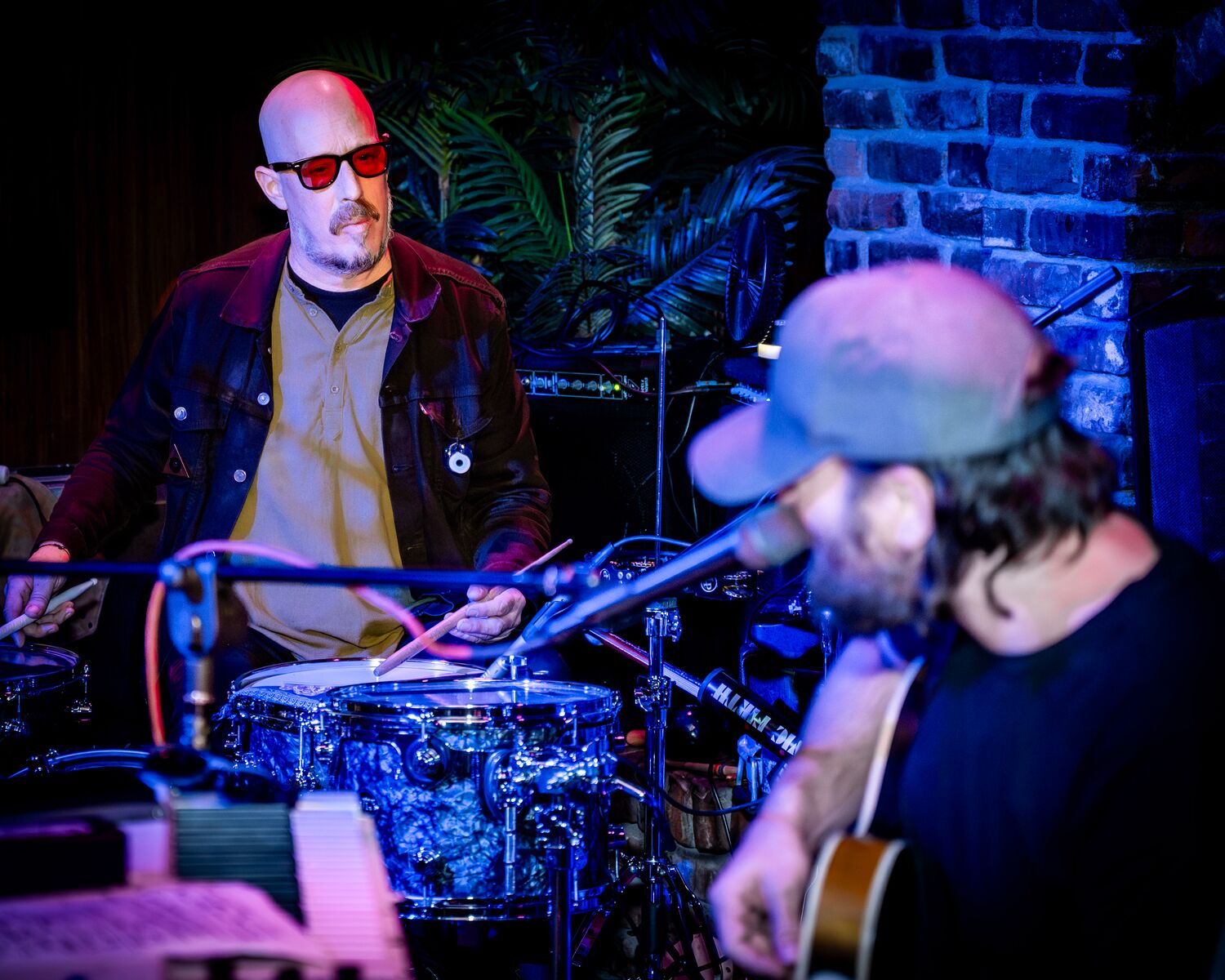 Alex Maas of the Black Angels (right) playing a stripped down show alongside drummer Rob Kidd. Credit: Jerome Parmer for The Oaklandside
Alex Maas of the Black Angels (right) playing a stripped down show alongside drummer Rob Kidd. Credit: Jerome Parmer for The Oaklandside
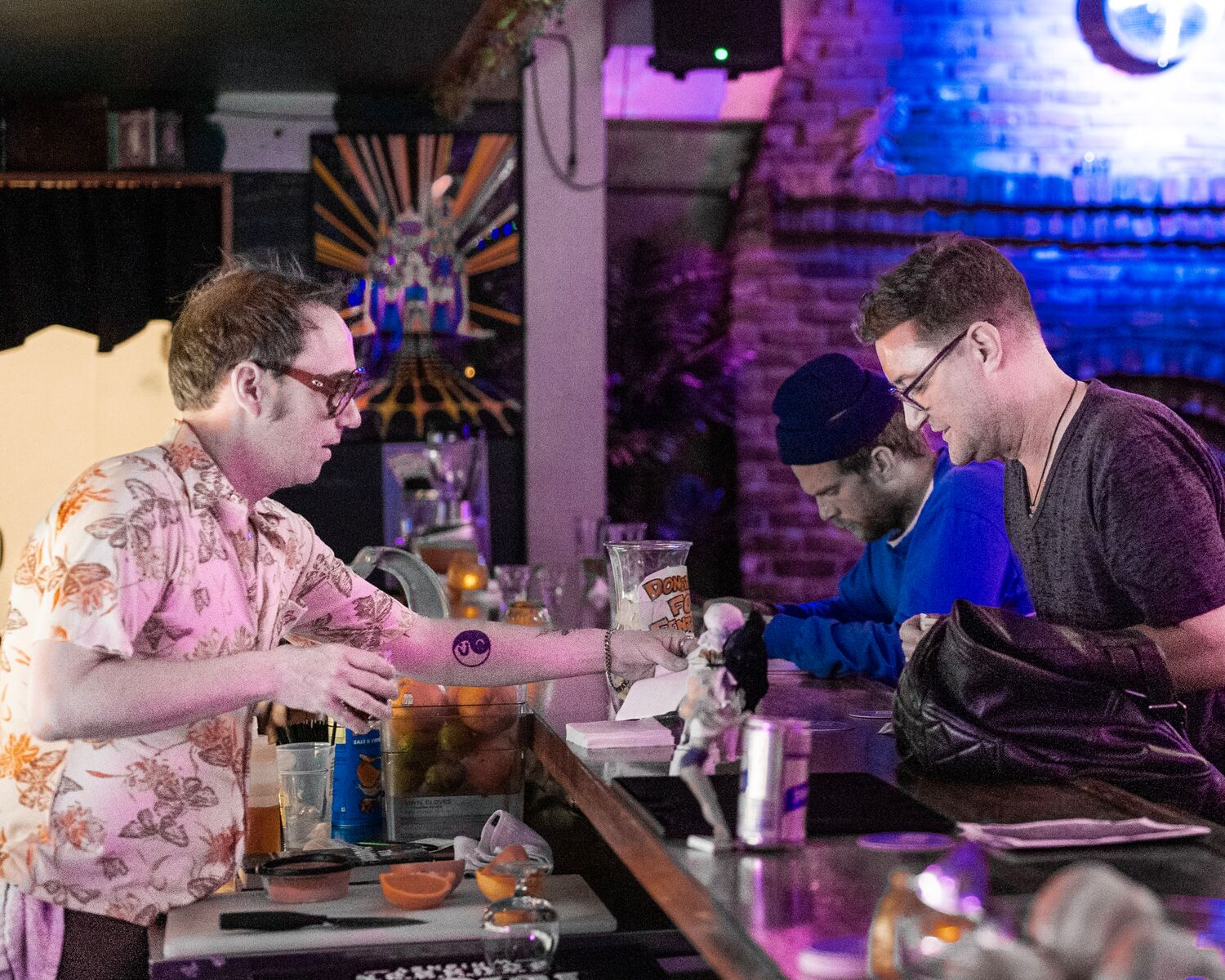 Attendees grab drinks ahead of the Alex Maas show at RIC Bar in Rockridge. Credit: Jerome Parmer for The Oaklandside
Attendees grab drinks ahead of the Alex Maas show at RIC Bar in Rockridge. Credit: Jerome Parmer for The Oaklandside
Crenshaw’s original concept for the backyard shows was to have musicians play an intimate show, where they would both be fairly compensated and help support various charities. Fans get a stripped-down show by an artist they love, and support a good cause at the same time.
What sets apart the concept of the intimate shows at RIC Bar that benefit Sofaburn, Inc. is that they are not advertised; there are no flyers, and no ticket link is provided. People typically find out through word of mouth, conversations at the bar, or when the artists announce the shows on social media. Instead of purchasing tickets, attendees are asked to make a donation to Sofaburn, Inc.
“When John Doe played, he donated the proceeds from his merch sale to the organization,” Crenshaw said.
Last fall, country artists Logan Ledger and Jeremy Pinnell played a sold-out show at RIC Bar, and Ayers said it was one of the most special shows he had ever seen. Both Crenshaw and Ayers said that even if you’re not a country fan, Pinnell’s voice will make you one. Ayers said that a “connection is made” listening to the artists that come to play at the bar.
“I was in tears. I see a lot of shows, but the shows that Kirk and I have put on here have been some of the best I’ve ever seen in my life,” Ayers said.
Ayers said that the shows are special not only because the artists know the proceeds help fellow musicians, but also because the intimate setting with fewer than 60 people in the room allows for fully immersive performances.
“The caliber of the people who play here is unbelievable,” Ayers said. “It’s something special.”
This year, The Lovemakers’ album “Times of Romance” turned 20, and the celebration included an intimate show at the bar.
“*” indicates required fields

